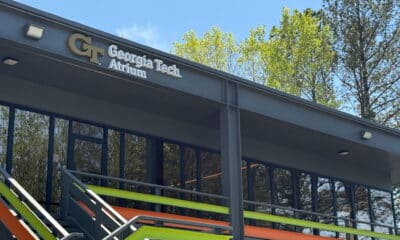Public Safety
Peachtree Corners Explores New Kind of Law Enforcement
Published
2 years agoon
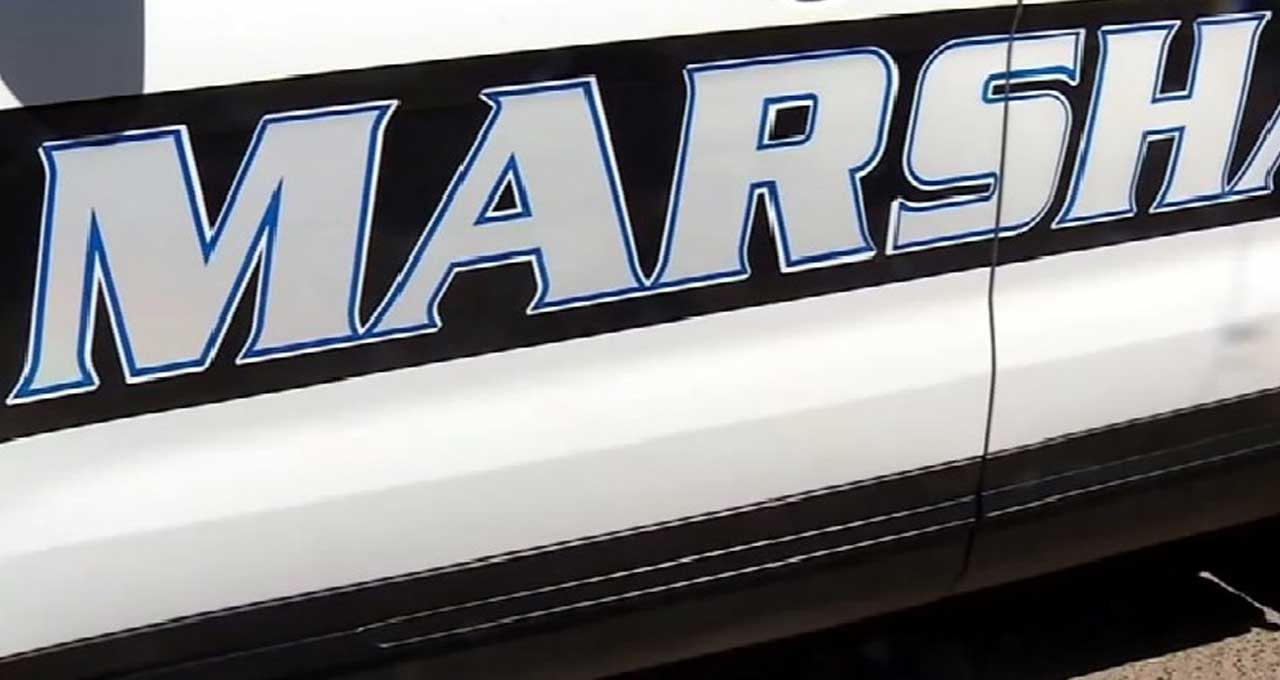
City Marshals may become a new hybrid between code enforcement and police officer.
The City of Peachtree Corners is growing its reputation as an incubator for smart technology. It is poised on the cutting edge of putting that genius to practical applications such as driverless shuttles and electric vehicle charging systems that may one day make it possible to drive from coast to coast without stopping to charge. However, the city is still in the shadow of recent violent crimes.
Several incidents this year have worried residents, government officials and city stakeholders that the quaint metro Atlanta bedroom community is becoming a target for murders and robberies. A man was shot and killed in the middle of a botched carjacking in July. In November, a Norcross High student was shot and killed in broad daylight near the school.
City leaders are testing and deploying smart technology, such as license plate readers and an extended video system using government, commercial business and home security cameras. Still, residents aren’t sure that’s enough.
The system has been scaled across the city and, to date, has helped recover more than $3 million in stolen property, and it has helped detectives solve multiple cases.
But some residents are asking to supplement the new-fangled stuff with some old-fashioned solutions such as employing a city police force. While that idea hasn’t been quashed entirely, the prohibitive costs make it somewhat unattractive in a city that assesses no personal property tax.
City considering marshals
Peachtree Corners isn’t looking at a crime wave of the magnitude the city of Atlanta faces every day. However, the most recent incidents, along with a rise in property crimes, is concerning. To address those concerns, the city is look at a compromise of sorts.
City Manager Brian Johnson recently spoke to Peachtree Corners Magazine during the Peachtree Corners Life podcast. He said the city is considering activating a city marshal system. Instead of a full-on police force, this could be a little different and still have the authority of the police.
“We have had some unfortunate incidents of late with deaths. There’s been some other crime and it’s not uncommon as we densify. As Metro Atlanta grows, Peachtree Corners is growing. And the more people you have in an area, there’s just more opportunities for bad actors,” said Johnson.
“So, there’s this unfortunate rise in these kinds of things. And, you know, property crime is still our main criminal activity type here, but we are just becoming more and more of a target for bad actors,” he said.
Johnson pointed out intersection takeovers. One of the most egregious happened around Easter Sunday.
“You’ve got these car clubs that are seizing control of an intersection and doing all sorts of dangerous things with automobiles,” Johnson said. “Even the failed carjacking that resulted in that death was a group of teens who specifically were targeting communities that had more affluence and better automobiles that they could do that slider crime where, you know, somebody’s pumping gas, or in this case, filling air in their tires not near the driver’s side, and they slide into the seat.”
He added that oftentimes, in those instances, the cars are still running, or the keys are left in the ignition.
Even with the increased crime-fighting efforts, there is the perception that crime has catapulted in a short span of time. But Johnson pointed out that the technology is working — especially the camera system.
“In the case of these two murders, our LPR [license plate recognition] cameras, the Fūsus network, …ended up being the method in which the police were able to identify the gunman — and find the gunman. So, they work,” said Johnson. “Unfortunately, they were used after a crime was committed. We’d like to do things to prevent it, but those are examples of what we’ve done so far.”
Gaps and potential solutions
The Peachtree City Council tasked Johnson with seeking out expert opinions of what other solutions may deter crime. Although Gwinnett County Police Department’s (GCPD) West Precinct is doing a good job with the resources it has, it is handcuffed with staffing shortages and the policy constraints that countywide police departments have.
“There are sometimes gaps in the ability to direct resources based on Peachtree Corners’ specific needs,” said Johnson.
The two considered options were to start up a Peachtree Corners Police Department, which would be redundant at times, based on the current service that Gwinnett PD provides when it does have the resources, or look for a different kind of law enforcement office.
“This gap is kind of between code enforcement officers, which are specifically oriented to enforcing local code and local code only, and law enforcement that’s enforcing state law,” Johnson explained. “There is a gap. The gap can be filled if we started up what we’re calling a City Marshal office, very similar to what Sugar Hill has.”
He noted that the positions would be filled by Peace Officer Standards and Training (POST) certified officers.
“The intent here is to have some people who are able to fill this gap by the authority vested in their position. And be able to have them controlled by the city so that they can be directed in areas that might be really important to Peachtree Corners,” Johnson said.
A good example of how this would work is the Norcross High incident. The victim had been off campus during school hours.
“There is a truancy problem of students cutting class and cutting through the woods into the back of businesses that border Norcross High School,” he said. “Those businesses are being adversely affected. The shooting was an unfortunate result of it. But the truancy continues on with students trespassing and doing things like destroying property, dealing drugs, doing drugs.”
An internal city marshal would be a deterrent to crime and a service to the businesses, he added.
“I can tell the city marshal, ‘I want you to go out to the school and I want you to do a presence patrol during the hours where there are gaps in these kids’ schedules …I want you to be driving around the back of those businesses,’” said Johnson. “This will allow us to detain somebody until a Gwinnett Police Officer gets there to arrest them.”
At this point, it looks like there would be three city marshals, Johnson said. The marshals wouldn’t be needed 24/7, as Gwinnett Police would continue to provide the majority of police protection.
Need and benefits of city marshals
In his last newsletter for the year, City Councilman Alex Wright further clarified the need for city marshals and how the officers would fit into Peachtree Corners’ public safety plans.
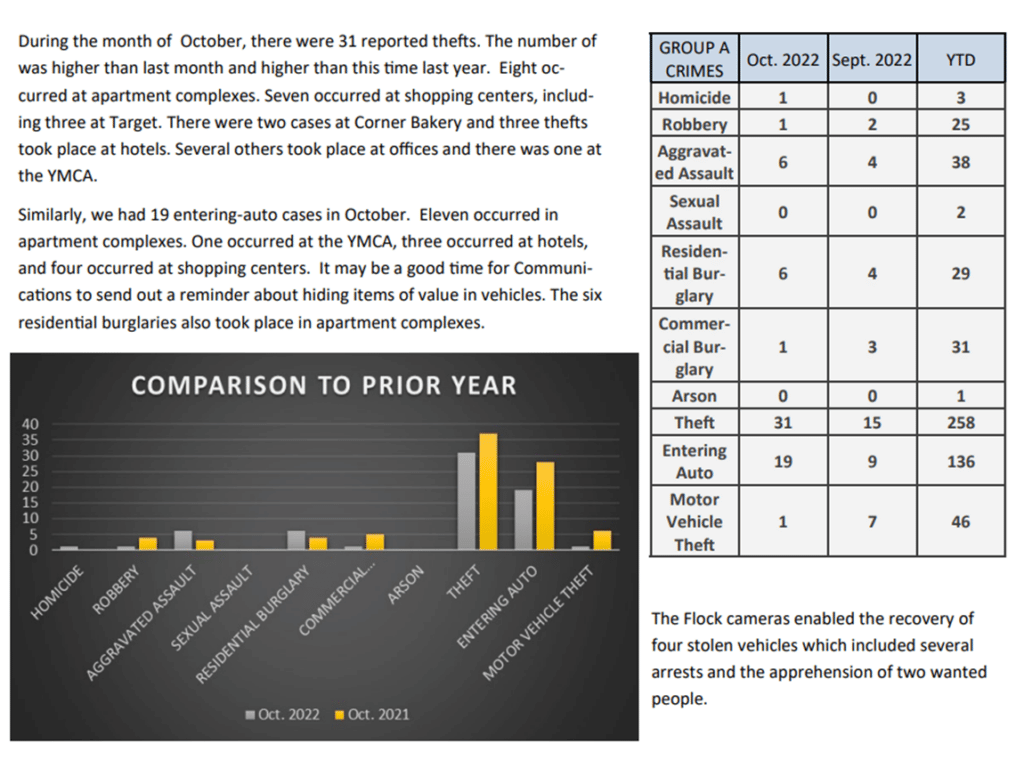
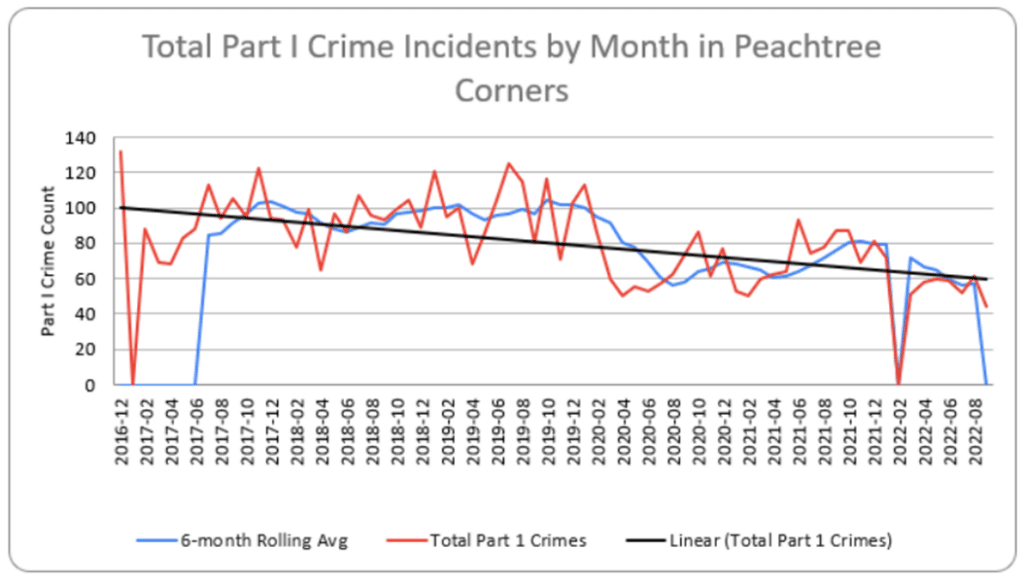
Wright was quick to point out that despite perception, crime has decreased in Peachtree Corners. Robbery, commercial burglary, theft, entering autos and motor vehicle theft are all down this year from the same period last year.
And the cameras are working. According to the city’s crime report, they aided in recovering four stolen vehicles and apprehending two wanted people.
The concept isn’t new. Other Gwinnett County cities — Sugar Hill, Buford and Berkeley Lake — utilize city marshals.
Wright gave examples of situations that have created the need for the city marshal program.
The legal department at Gwinnett County has instructed the GCPD not to enforce city specific ordinances. An example of how this is a problem was when a large, loud party held in a residential neighborhood.
A resident called the police. The police showed up, but since the ordinance they were violating was a city-specific noise ordinance, the police had been instructed not to intervene. So, the party proceeded.
In this instance, a city marshal would be empowered to enforce the ordinance and, if necessary, issue orders to cease and even make arrests, with the same powers as a police officer. A code officer cannot do that.
Unruly behavior at the Town Center is another example. The off-duty police officer is not actively patrolling. He is sitting in his car — and the city has no authority to direct him.
A city marshal would be able to enforce city ordinances and keep the peace.
Related
Arlinda Smith Broady is part of the Boomerang Generation of Blacks that moved back to the South after their ancestors moved North. With approximately three decades of journalism experience (she doesn't look it), she's worked in tiny, minority-based newsrooms to major metropolitans. At every endeavor she brings professionalism, passion, pluck, and the desire to spread the news to the people.

City Government
The Future of Law Enforcement in Peachtree Corners: Community Meeting
Published
2 weeks agoon
April 14, 2025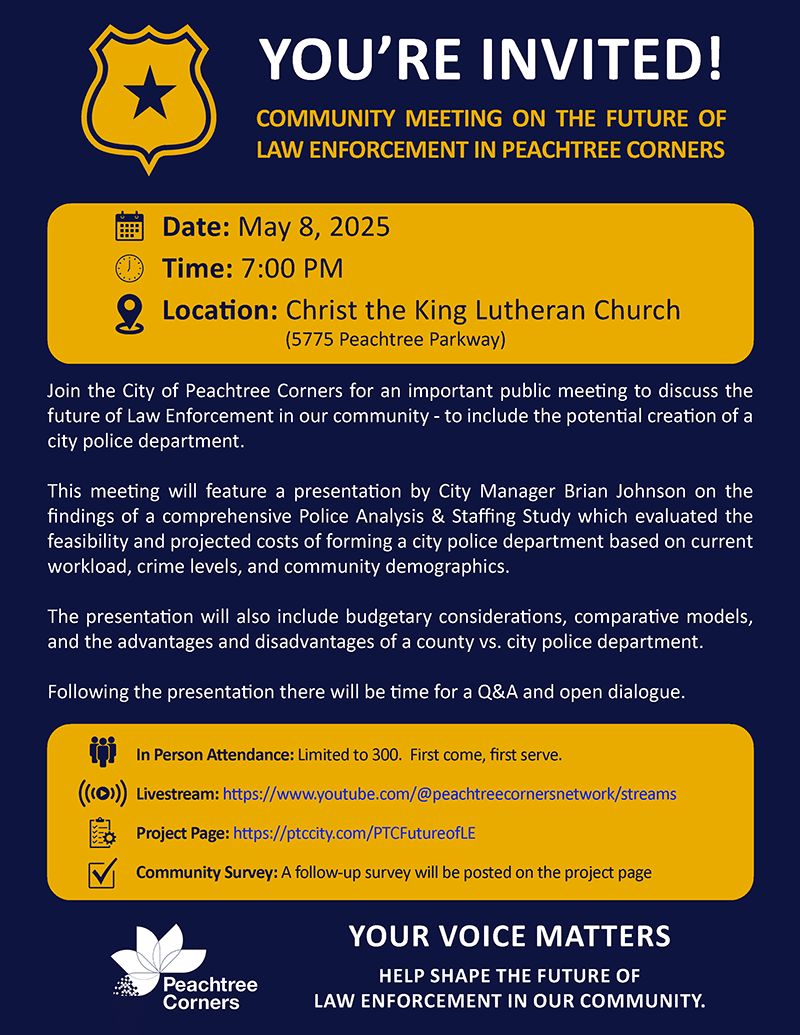
The City of Peachtree Corners will hold an important public meeting on May 8 to discuss the future of law enforcement in our community — including the potential creation of a city police department.
This meeting will feature a presentation by City Manager Brian Johnson on the findings of a comprehensive Police Analysis & Staffing Study that evaluated the feasibility and projected costs of forming a city police department based on current workload, crime levels and community demographics.
The presentation will also include budgetary considerations, comparative models and the advantages and disadvantages of a county vs. city police department.
Following the presentation, there will be time for a Q&A and open dialogue.
In-person attendance is limited to 300. First come, first served. A livestream option will be available for those who can’t attend in person.
After the meeting, a follow-up survey will be available on the city’s project page.
Meeting details
The Future of Law Enforcement in Peachtree Corners
Date/Time: May 8, 2025 at 7 p.m.
Location: Christ the King Lutheran Church (5775 Peachtree Parkway)
For more information, visit peachtreecornersga.gov.
Related
City of Peachtree Corners
Peachtree Corners Prepares for Another Roundabout
Published
2 weeks agoon
April 12, 2025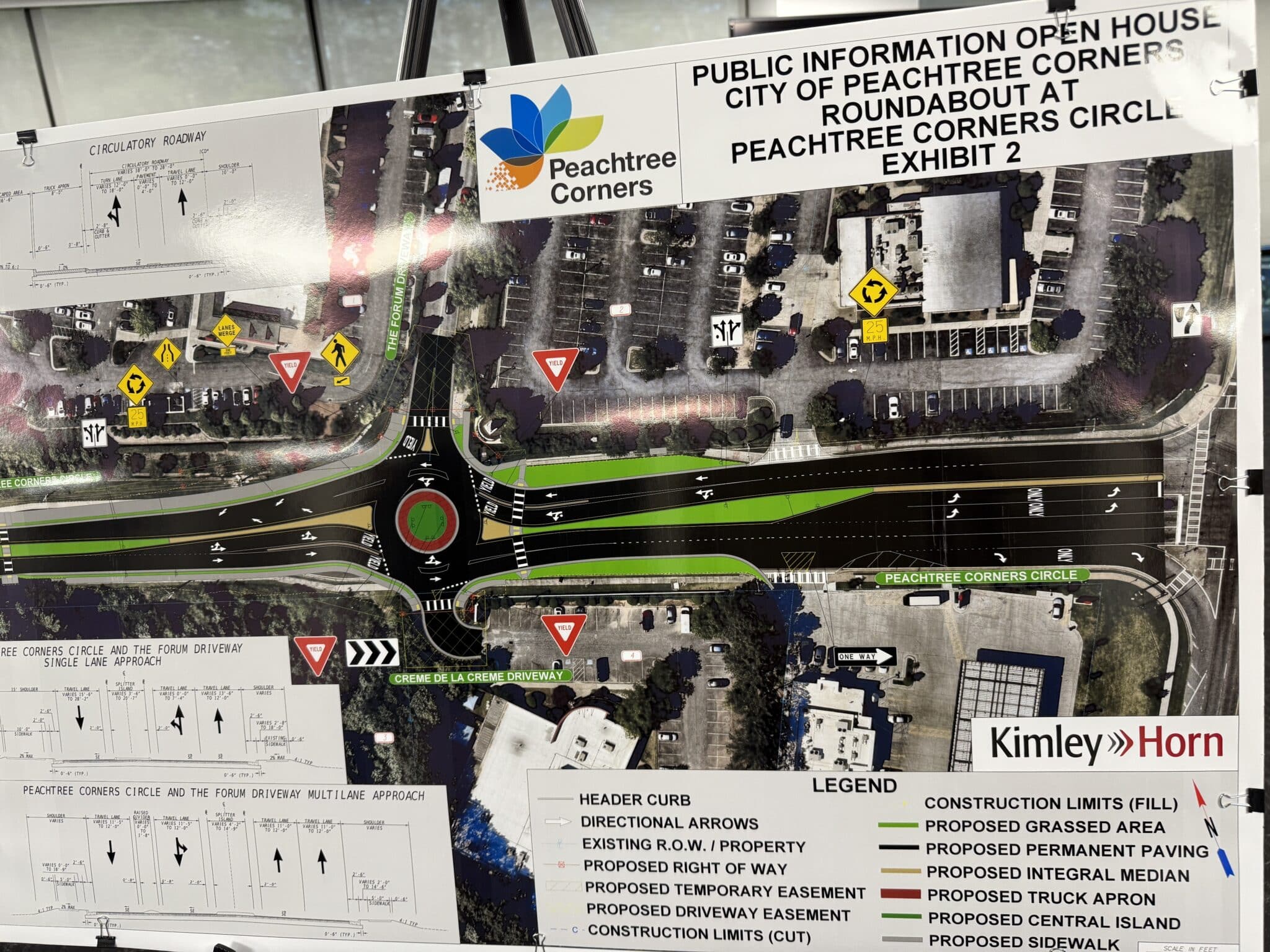
Many residents express concerns that it won’t fix traffic problems
If the term “roundabout” conjures up images of Chevy Chase caught in an endless circle in the 1985 film, “National Lampoon’s European Vacation,” you probably haven’t given the more modern versions here in metro Atlanta much of a chance.
Peachtree Corners plans to add a second roundabout in the city, adding to the first one built in 2018. That one, at Medlock Bridge Road and Peachtree Corners Circle, generated hundreds of social media comments from residents and stakeholders who were frustrated with the chosen solution for the busy intersection.
Hoping to alleviate some of the angst this time, a public information meeting on March 27 gave those interested in the planned roundabout at Peachtree Corners Circle — positioned between The Forum entrance and Crème de la Crème — an opportunity to look at the plans. About 20 people showed up.
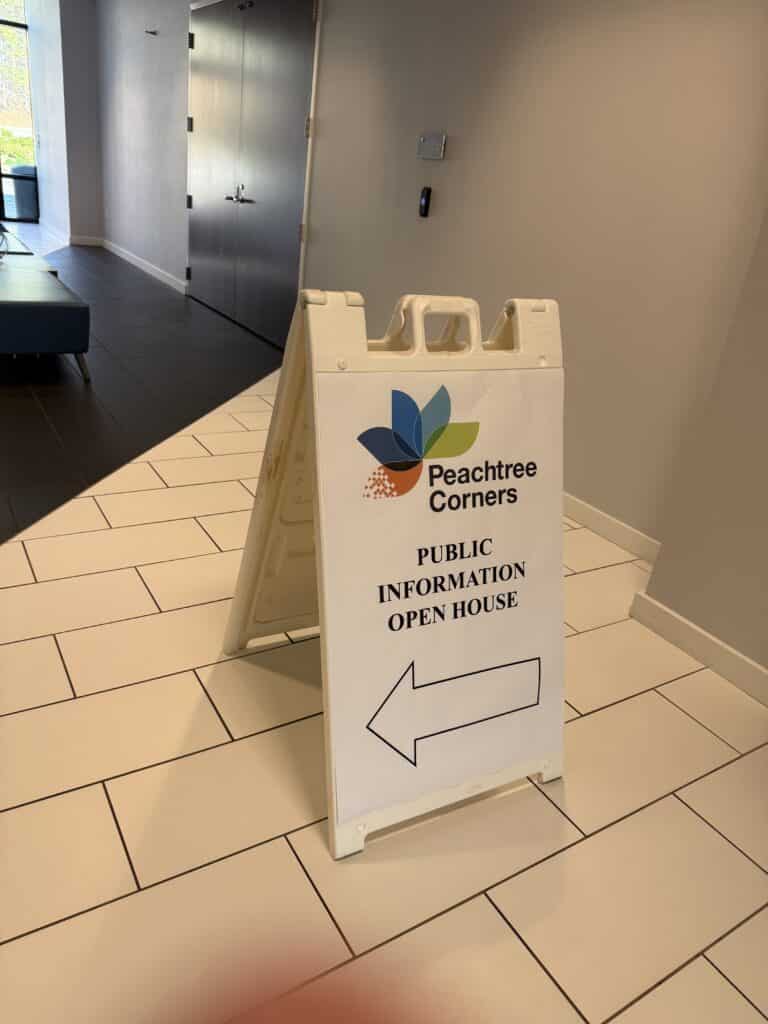
Peachtree Corners Public Works Director Greg Ramsey, who facilitated the open house, said some who came in with the opinion that the roundabout wasn’t a good idea had changed their minds by the time they left.
“We had one couple who came in who said they didn’t like the idea at first, but after watching the videos and seeing the renderings and talking to our staff and our design team, that that they had their minds changed, that they felt like it’s going to be a positive change and a positive addition and safer for the entire community,” he said.
Designed to improve traffic flow and safety, this new intersection will feature pedestrian-friendly crossings, dedicated bike lanes and better access to local businesses, according to the city. Peachtree Corners officials and engineers from Kimley-Horn shared insights on the design, traffic impact and construction timelines.
High rate of traffic crashes
When the first roundabout opened, Ramsey told the Atlanta Journal-Constitution, “Roundabouts promote a continuous flow of traffic in all directions versus a traditional traffic signal that stops at least one direction at all times. The roundabout allows for a greater volume of traffic through an intersection while minimizing delays, particularly during off-peak hours.”
He still believes it’s the best solution for many blocked areas.
Back in January of 2022, the city of Peachtree Corners commissioned a study to determine what type of traffic calming device would help alleviate congestion and cut down on crashes along Peachtree Corners Circle between The Forum’s major driveway and Peachtree Parkway.
Crash data for the five-year period between January 1, 2017 and December 31, 2021 showed that approximately 69% of the 36 crashes reported in the area were property damage only, and just one crash resulted in suspected serious injury.
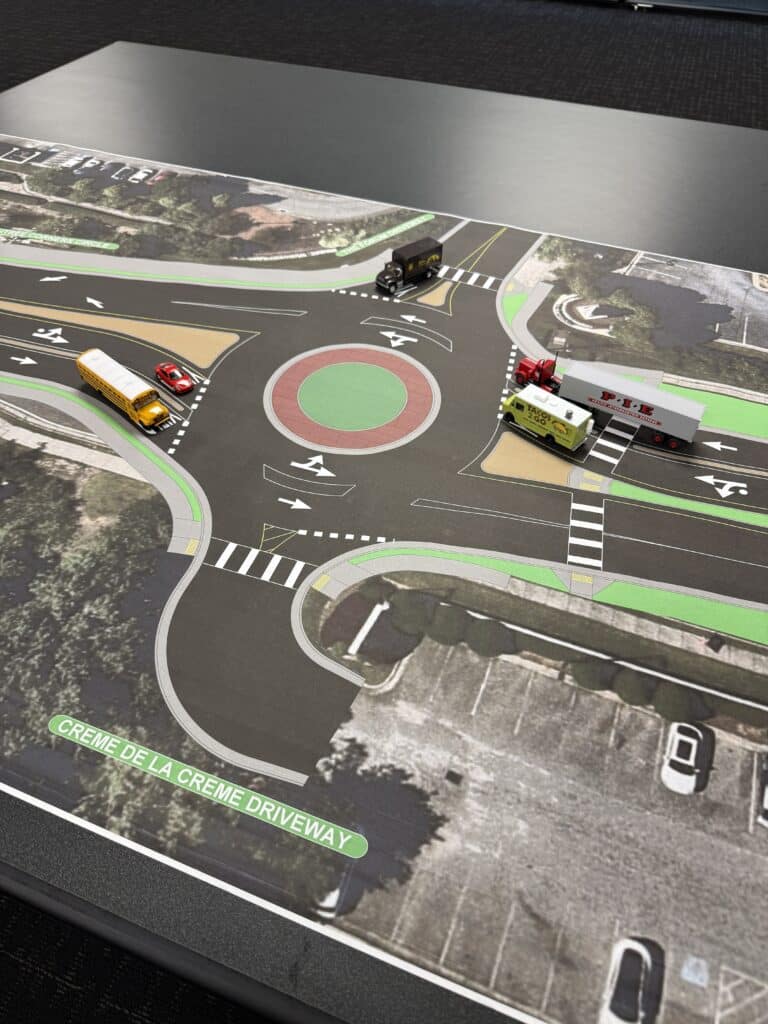
Crashes were also evaluated based on the manner of collision. Approximately 83% of the total reported crashes within the study area were either angle or rear-end type crashes. Each had 15 occurrences. Sideswipes and single-vehicle crashes were also reported within the analysis window.
- The highest crash frequency occurred in the right-turn lane approaching Peachtree Parkway. Seven rear-end-type crashes occurred within the turn lane.
- The second highest crash frequency occurred at The Forum’s main driveway, where six crashes were caused by drivers turning left from The Forum crashing with westbound through-traffic on Peachtree Corners Circle.
- Three sideswipes occurred in the westbound lanes of Peachtree Corners Circle just west of Peachtree Parkway.
- Of the total reported crashes within the study location, 12 occurred at the intersection of Peachtree Corners Circle and The Forum’s major driveway.
- Of the 15 reported rear-end crashes, 10 of them occurred at the intersection of Peachtree Parkway and Peachtree Corners Circle.
- Of the 14 crashes reported at The Forum’s major driveway, nine were angle crashes.
- Six of the eight reported crashes at The Forum’s minor driveway/QuikTrip driveway were angle crashes. One of these reported angle crashes involved a bicyclist, who was seriously injured.
Because angle crashes cause the greatest number of fatalities and injuries of all crash types, safety improvements were a high priority in this intersection control study.
Why here, why now?
Prompted by the crash rates, the next step was to find a solution. Due to multiple conflict points that involved vehicles, pedestrians and high traffic volumes (locations where the paths of road-users coincide, representing potential crash areas and categorized as crossing, merging, diverging or pedestrian interaction), several options were ruled out.
“The need was a safety one. There are a lot of conflict points out there between vehicles turning in all directions and pedestrians in the area as well,” said Ramsey. “There’s a daycare and gas station there and very high traffic volumes at certain periods of the day.”
This particular intersection proved tricky because of the volume and variety of traffic.
“With four or five driveways and lots of traffic dumping onto the street coming from The Forum and other businesses there, you can imagine multiple periods of high volume — like the lunch hour rush,” he continued. “Additional traffic is being projected as well for multi-family [structures] that have been rezoned in that development.”
He added that many people also feel the need to speed through the intersection.
“Unfortunately, a lot of that traffic is going at a high rate of speed and so some of these crashes and near misses that we’ve seen are extreme.”
Improved safety and feasibility
Traffic studies and feasibility reports approved by Gwinnett County to reduce accidents and improve traffic flow in the area showed that traditional traffic signals are impractical due to proximity to 141.
With the success of the roundabout at Peachtree Corners Circle and Medlock Bridge Road, though, Ramsey said once people get used to it, they’ll find that it is for the better.
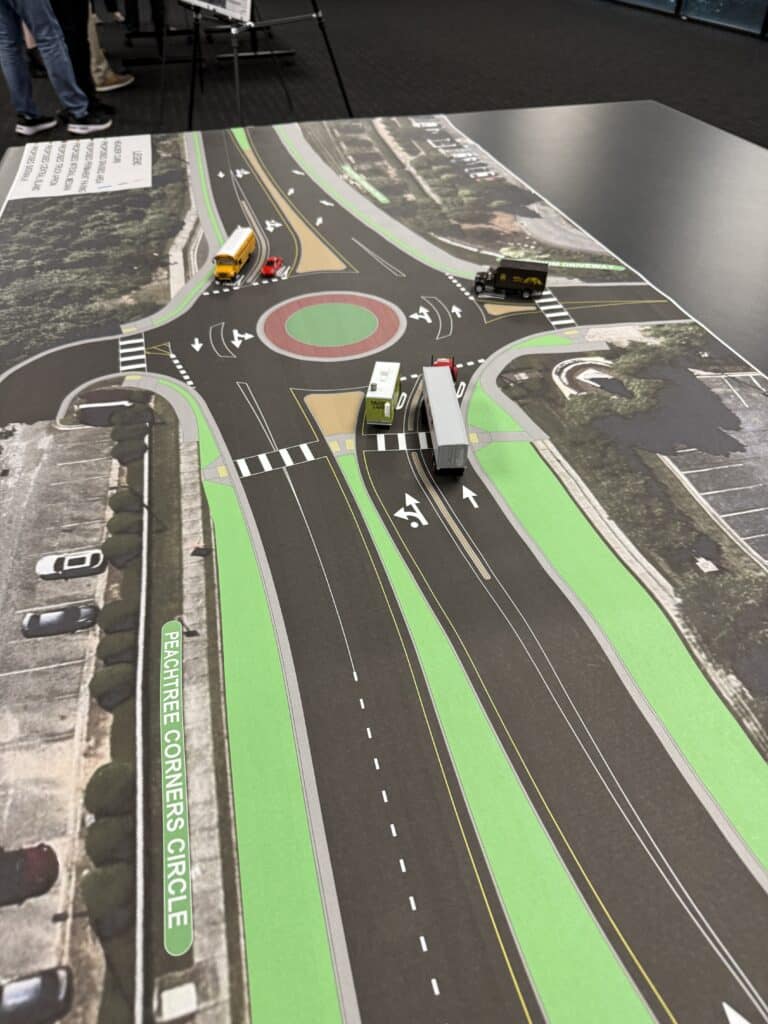
“It certainly has improved safety at that intersection, and we’ve been very pleased with how it turned out,” he said. “Incidentally, there was a lot of negative community feedback when that roundabout was proposed, but ironically, two years after that project opened, the Atlanta Journal-Constitution wrote an article saying, basically, ‘Hey, this turned out to be okay after all.’”
The city council has funded the new project design and conceptual development, as well as the traffic study, so right now it’s progressing forward, Ramsey added.
“This is not like a rezoning where there’s public hearings, it’s just a public project that the city has in its annual capital improvement program, just like a number of other intersection improvements that we’ve done, are doing and will be doing,” he said.
How roundabouts help with traffic
Ramsey shared that roundabouts act in two ways.
“Number one, it’s a traffic calming mechanism. It slows people down and slower traffic is safer traffic, especially when pedestrians are involved. And at the same time, it keeps traffic moving,” he said. “And then at the same time again, not stopping at a red light, having to sit there idling your vehicle and sitting in the hot sun is a plus — traffic is always flowing.”
He pointed out many cities in Europe as well as the city of Carmel-by-the-Sea are big proponents of roundabouts. He added that there are cities in Indiana that would like to do away with traffic signals altogether and use roundabouts exclusively. Metro Atlanta has several examples as well, including the Riverside Drive on-ramp to I-285.
The next phase of the project is sending out a request for proposals for construction. Ramsey said it should be out by late summer/early fall.
“It’s a rough timeline right now, and there’s nothing set in place for a variety of factors — right-of-way and easement acquisition needs that are required,” he said.
Right now the timeline is looking like completion will be in 18 months or so.
Public reaction
The comments on the Peachtree Corners Life Facebook page a few days after the open house were a mixed bag.
Gail Livor Glattli: Hate those things. Nobody knows how to use them correctly.
Actually, roundabouts are pretty easy to navigate, said Ramsey.
“Obviously, you’re going to approach something new. We hope you’re paying attention about how to get through it,” he said. “But then the second, third and many times after they go through it, I think the comfort level grows. And certainly if you’re not distracted with your phone or other devices in your vehicle, paying attention to the signage and the channelization of the roadway is doable.”
Doug Edstrom: Oh boy, can you offer a free training class on how to proceed through one of these?
The Federal Highway Administration has a YouTube video that explains how to navigate roundabouts.
Karin Arranz: Traffic there is a cluster. Hopefully this will help fix the near misses we deal with daily.
Michael Falkner: Thank goodness. Anything is better than that current mess.
Glen G. Gordon: This is badly needed and will help tremendously. I like that the crosswalk at the Forum driveway is set back a bit.
Port Rose Kaufman: Why don’t they just put up a light at that corner? I’ve seen at least 10 accidents there over the years.
Ramsey said a traffic signal isn’t allowed there.
“It’s too close to 141 for a traffic signal with the standard red light, green light at that intersection,” he said. “It’s against GDOT standards to put in a signal at that close proximity. It would actually back up traffic into 141, which would make that heavy intersection even worse, and that’s certainly something we want to avoid.”
Bob Ballagh: A whole lot better than the current intersection.
“Obviously, we’ve got a few people who are just against the idea, but I’m not sure that we’re going to ever be able to make everybody happy,” said Ramsey.
“We’re trying to make the best solution possible. There’s going to be some discomfort with change for some people on everything we do, but we believe this is the best solution of those that are available to us.”
For more information about the project, visit peachtreecornersga.gov/1449.
Ramsey also encouraged residents and stakeholders with questions to contact his department at publicworks@peachtreecornersga.gov.
Related
Public Safety
From the Mayor: The Use of Advanced Techniques for a Safer Peachtree Corners
Published
2 months agoon
March 10, 2025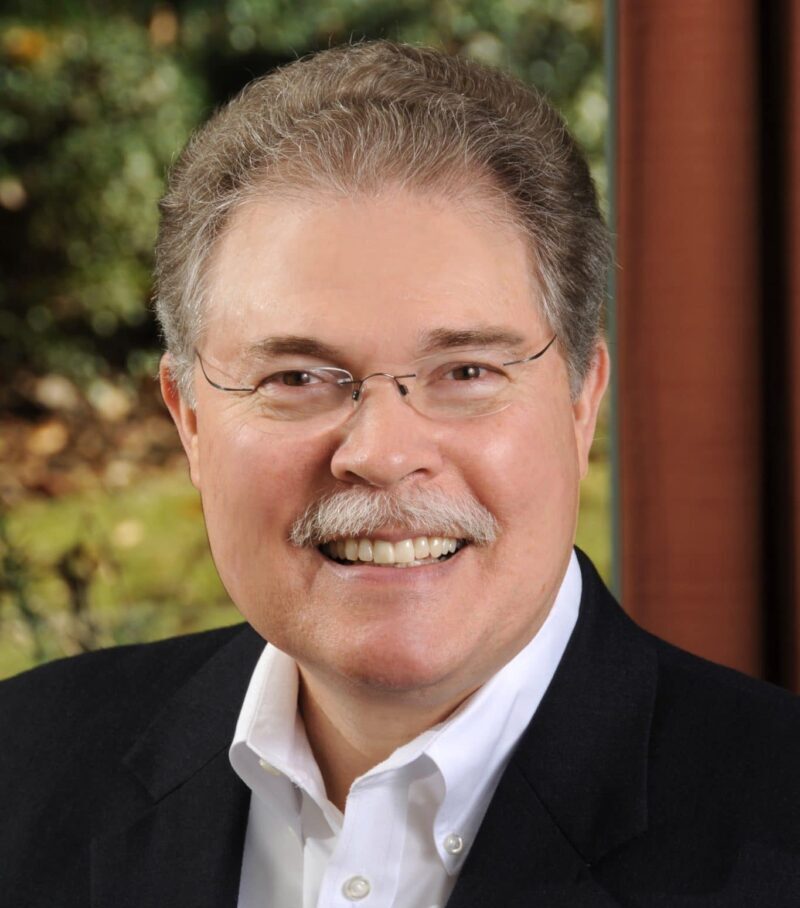
City Marshals use innovative tools and practices to uncover illegal nightclub in Peachtree Corners
I am proud to share the ongoing efforts of our city’s dedicated marshal’s office in ensuring the safety and integrity of our community. Recently, their diligent work uncovered an illegal nightclub operating in our city, hidden behind the facade of a small retail storefront.
Upon investigation, our marshals found that most of this leased space was being used as an unlicensed nightclub and hookah lounge. This operation had never been permitted, lacked a business license and was in direct violation of fire codes and state regulations.
Despite a legal occupancy limit of 60 people, over 200 individuals were regularly packed into this hidden venue.
The state’s Department of Revenue was brought in due to alcohol being served without a proper license. This situation posed a significant safety risk, one that could have resulted in severe consequences had it continued unnoticed.
Thanks to the expertise and perseverance of our marshals, the illegal club was identified, citations were issued and the operation was shut down before any potential disaster occurred.
These types of establishments are not just a matter of regulatory oversight; they often attract individuals seeking to evade the law, which can lead to dangerous situations, including violence and other criminal activities.
By taking swift action, we may have prevented a serious incident from occurring in our city.
Using innovative technology for public safety
Our city marshals leveraged technology, including drones and social media monitoring techniques, to monitor activity and gather the necessary evidence, ensuring that enforcement actions were backed by undeniable proof. The use of such tools has become an integral part of our law enforcement strategy, allowing us to maintain public safety effectively and efficiently.
Our marshals’ ability to adapt and incorporate innovative methods is a testament to their commitment to protecting our residents.
I want to commend our marshals and additional law enforcement partners for their exceptional work in this matter. Their dedication to upholding the law and safeguarding our community is truly commendable. We will continue to utilize all available resources to keep Peachtree Corners a safe and thriving place for all.
Thank you for your continued support in making our city a great place to live, work and play.
For more about the City of Peachtree Corners, visit peachtreecornersga.gov.
Related
Read the Digital Edition
Subscribe
Keep Up With Peachtree Corners News
Join our mailing list to receive the latest news and updates from our team.
You have Successfully Subscribed!

Peachtree Corners Prepares for Another Roundabout

The Future of Law Enforcement in Peachtree Corners: Community Meeting

SCB Construction Group Partners with CGA Reps on New Peachtree Corners HQ

GA Tech, Peachtree Corners Solidify Partnership with First-of-its-Kind Venue

Two Peachtree Corners Business Leaders Named Finalists for EY Entrepreneur Award

Peachtree Corners City Guide 2025: Spring/Summer Digital Edition

Peachtree Corners City Guide 2025: Spring/Summer Digital Edition

Two Peachtree Corners Business Leaders Named Finalists for EY Entrepreneur Award

GA Tech, Peachtree Corners Solidify Partnership with First-of-its-Kind Venue

SCB Construction Group Partners with CGA Reps on New Peachtree Corners HQ

The Future of Law Enforcement in Peachtree Corners: Community Meeting

Peachtree Corners Prepares for Another Roundabout

Experience Shakespeare in the Park with Contemporary Classics’ Twelfth Night

Registration Now Open for Light Up the Corners 2025

Light up the Corners [Video]

Capitalist Sage: Business Leadership in Your Community [Podcast]

Cliff Bramble: A Culinary Adventure through Italy

Top 10 Brunch Places in Gwinnett County

A Hunger for Hospitality

THE CORNERS EPISODE 3 – BLAXICAN PART 1

Top 10 Indoor Things To Do This Winter

The ED Hour: What it takes to Remove Barriers from Education




